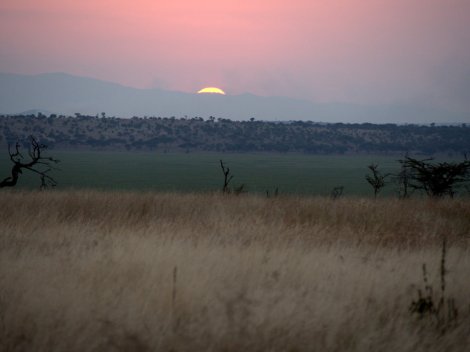 The flat green expanse below where we’re camped in Lakmakau looks like a welcome respite from the dry dust of the rutted roads that led us here. But the soft marshland mud beneath the grass can swallow a car whole and leave no trace. Even the elephants are barely visible in the sea of green, sinking, Noele tells me, up to their knees as they venture deep into the marsh for sweet long grass and cool mud to pack on their flanks. From the road, all we can see are the backs of the tallest ones, looking like flat rocks resting in a shallow but immense pond.
The flat green expanse below where we’re camped in Lakmakau looks like a welcome respite from the dry dust of the rutted roads that led us here. But the soft marshland mud beneath the grass can swallow a car whole and leave no trace. Even the elephants are barely visible in the sea of green, sinking, Noele tells me, up to their knees as they venture deep into the marsh for sweet long grass and cool mud to pack on their flanks. From the road, all we can see are the backs of the tallest ones, looking like flat rocks resting in a shallow but immense pond.
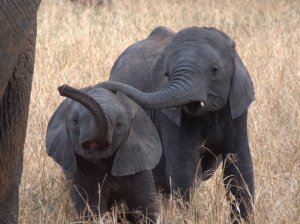 Further north, where the marshland bends eastward, there is open water. This, Gary says, is where the action always is. Water is life, so at some point or another every animal, predator or prey, must come to the water’s edge. We’ve been spending mornings here too, safely removed from the food chain by dint of the pair of open-sided Land Cruisers we’re riding in. When we’re “in the box”, Gary says, the animals here seem to consider us as natural – albeit mobile – features of the landscape rather than part of the traditional cycle of life: this morning, while we were fixated watching one leopard lolling about in a tree, another sauntered out of the grass at the road’s edge and, rather than walking around the front Land Cruiser on its quest for a new lounging spot, simply crawled under it and went on its way without looking back at the car’s startled occupants.
Further north, where the marshland bends eastward, there is open water. This, Gary says, is where the action always is. Water is life, so at some point or another every animal, predator or prey, must come to the water’s edge. We’ve been spending mornings here too, safely removed from the food chain by dint of the pair of open-sided Land Cruisers we’re riding in. When we’re “in the box”, Gary says, the animals here seem to consider us as natural – albeit mobile – features of the landscape rather than part of the traditional cycle of life: this morning, while we were fixated watching one leopard lolling about in a tree, another sauntered out of the grass at the road’s edge and, rather than walking around the front Land Cruiser on its quest for a new lounging spot, simply crawled under it and went on its way without looking back at the car’s startled occupants.
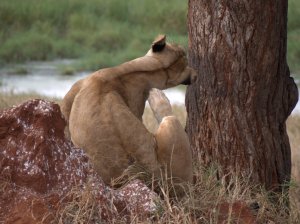 Lions, likewise, seem to have no damns to spare for our presence. An elephant blocking the road will regard us complainingly before tottering heavily to one side or the other, but the lions – even the mother and her cubs we encountered on the first day – glance lazily up from their mid-morning dust baths/naps as if to say “What – are you still here?” and turn away, considering the matter dealt with. The only way to get past is to leave the road and drive around them.
Lions, likewise, seem to have no damns to spare for our presence. An elephant blocking the road will regard us complainingly before tottering heavily to one side or the other, but the lions – even the mother and her cubs we encountered on the first day – glance lazily up from their mid-morning dust baths/naps as if to say “What – are you still here?” and turn away, considering the matter dealt with. The only way to get past is to leave the road and drive around them.
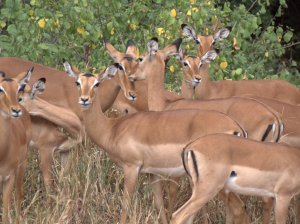 The zebras and impala seem a little more skittish around cars, if only because, when you’re at the bottom of the food chain, evolution favors being skittish of anything that moves. To be more precise, our days here have taught us that skittishness is not so much governed by a food chain as by a network of “gives a damn”, the order of which becomes apparent when you see animals negotiating water access with each other in pairs.
The zebras and impala seem a little more skittish around cars, if only because, when you’re at the bottom of the food chain, evolution favors being skittish of anything that moves. To be more precise, our days here have taught us that skittishness is not so much governed by a food chain as by a network of “gives a damn”, the order of which becomes apparent when you see animals negotiating water access with each other in pairs.
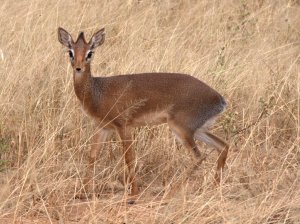 By the second day we’d watched lions vs elephants (elephants: nonchalant; lions: wary), then the elephants vs leopard (elephants: nonchalant; leopard: fast asleep in tree). Then impala vs lions (impala: predictably alarmed and snorting like crazy; lions: not giving a damn) and finally jackals vs lions (jackals: treading carefully; lions: trying hard to give even less of a damn than with the impala). The next day however, the lions seemed to have more damns to give: the lioness of the pride that was camped out in the bushes appeared to be using our car as visual cover as she stalked a herd of zebra that were nervously inching their way around the approach to the water. They eventually got downwind of her, caught a whiff and bolted, at which point she resumed acting like she never really had given a damn about those zebras; she was just curious what they were up to.
By the second day we’d watched lions vs elephants (elephants: nonchalant; lions: wary), then the elephants vs leopard (elephants: nonchalant; leopard: fast asleep in tree). Then impala vs lions (impala: predictably alarmed and snorting like crazy; lions: not giving a damn) and finally jackals vs lions (jackals: treading carefully; lions: trying hard to give even less of a damn than with the impala). The next day however, the lions seemed to have more damns to give: the lioness of the pride that was camped out in the bushes appeared to be using our car as visual cover as she stalked a herd of zebra that were nervously inching their way around the approach to the water. They eventually got downwind of her, caught a whiff and bolted, at which point she resumed acting like she never really had given a damn about those zebras; she was just curious what they were up to.
…
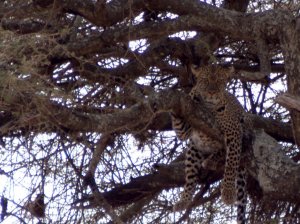 It’s now day four at Lakmakau, and we’ve settled into a sort of a routine. We’re woken at six each morning by Cornelius or Sampson or Greg announcing the time from outside our tent. They fold back the netting on the veranda (yes, each guest tent has a veranda) and leave a thermos of tea for Devon and a French press full of Tanzanian coffee for me on the table. We have until 6:30 to muster for breakfast at the main tent. If we show up earlier, we can socialize and take seconds on coffee or tea around the campfire. Breakfast is usually a decadent spread of fruit (mangos, guava, pineapple, avocado), pancakes (best with Tanzanian honey), fried potatoes, sausage and crispy bacon. Invariably, there are also two plates of Scotch Bonnet peppers on the table so that Gary can reach one and dice it into whatever he’s eating.
It’s now day four at Lakmakau, and we’ve settled into a sort of a routine. We’re woken at six each morning by Cornelius or Sampson or Greg announcing the time from outside our tent. They fold back the netting on the veranda (yes, each guest tent has a veranda) and leave a thermos of tea for Devon and a French press full of Tanzanian coffee for me on the table. We have until 6:30 to muster for breakfast at the main tent. If we show up earlier, we can socialize and take seconds on coffee or tea around the campfire. Breakfast is usually a decadent spread of fruit (mangos, guava, pineapple, avocado), pancakes (best with Tanzanian honey), fried potatoes, sausage and crispy bacon. Invariably, there are also two plates of Scotch Bonnet peppers on the table so that Gary can reach one and dice it into whatever he’s eating.
Deciding who will ride in which of the two cars seems to be a constant challenge – the three boys are inseparable, but beyond that, the adults seem to engage in a form of musical chairs, taking turns hopping out of one and into the other (“No, but if you’re riding with Karen, why don’t I help Colin with the boys?”) until Gary and Arnold start the engines and the music stops.
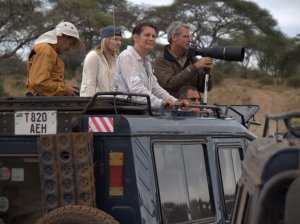 Then it’s a drive. Mornings have had a fairly constant cloud cover that doesn’t really burn off until 10 or 11, and with the wind in the open cars, I’ve been glad to have my fleece handy. So far, we’ve always headed north, to the bend in the marsh where the open water begins, and explored the roads from there. Yesterday we turned west at Salile and looked for impala and hartebeest in the drier highlands; today we followed the river north for giraffe and cape buffalo. On the way, there’ve always been lions, jackals, zebras, ostrich and elephants. Lots of elephants. And each day we’ve just about run our camera batteries flat with photos, swearing that we might as well delete all our photos from the day before, seeing as how far they’d pale in comparison with what we’ve seen today.
Then it’s a drive. Mornings have had a fairly constant cloud cover that doesn’t really burn off until 10 or 11, and with the wind in the open cars, I’ve been glad to have my fleece handy. So far, we’ve always headed north, to the bend in the marsh where the open water begins, and explored the roads from there. Yesterday we turned west at Salile and looked for impala and hartebeest in the drier highlands; today we followed the river north for giraffe and cape buffalo. On the way, there’ve always been lions, jackals, zebras, ostrich and elephants. Lots of elephants. And each day we’ve just about run our camera batteries flat with photos, swearing that we might as well delete all our photos from the day before, seeing as how far they’d pale in comparison with what we’ve seen today.
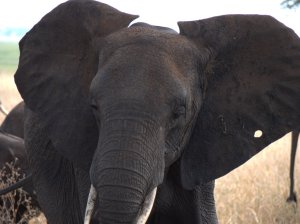 Tomorrow Gary’s allowing us a late start. We’ll be breaking camp – no, we’ll be leaving camp; the luxury accommodations that Gary’s team has set up here will be in use until the dry season ends in November. But we’ll be driving north for the Ngorongoro Crater. New terrain and new animals. And undoubtedly, more oaths that everything we’ve seen so far can’t hold a candle to whatever it is we’re looking at right now.
Tomorrow Gary’s allowing us a late start. We’ll be breaking camp – no, we’ll be leaving camp; the luxury accommodations that Gary’s team has set up here will be in use until the dry season ends in November. But we’ll be driving north for the Ngorongoro Crater. New terrain and new animals. And undoubtedly, more oaths that everything we’ve seen so far can’t hold a candle to whatever it is we’re looking at right now.
[Still have a couple of days to catch up on, but we’re about to go offline until mid-week next week. Stay tuned then!]


Can you see the envy from there?
LikeLike
Yeah, the weather’s been pretty good, except for those scattered envy showers. We’re dealing as best we can.
LikeLike